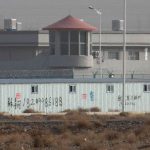On the edge of a dusty town in Kurdish-controlled northeastern Syria, a small team of lawyers are doing something remarkable; a task no other government globally is willing to do.
Suspect by suspect, the lawyers are putting alleged members of the Islamic State on trial and Sky News has been given exclusive access to one man’s hearing.
An Islamic State suspect
His name is Shabib Ali Shabib and he’s 21.
We watch as he is led into the small courthouse by a guard.
His head is bowed as he is guided up the stairs to a small simple courtroom. A single chair faces a desk where three judges prepare to question him.
“The charges against Shabib Ali Shabib, born in 1999, from the city of Hassakah, town of Melabieh, village of Al Khamayel, who left to join the terrorist organisation Daesh (Isis)…” the presiding judge says.
IS was defeated two years ago after four years in which it occupied and terrorised large parts of Syria and Iraq.
Thousands of IS fighters survived the final battle in the Syrian town of Bagouz in early 2019.
Please use Chrome browser for a more accessible video player
Ever since they have been held in insecure and inadequate prisons in the Kurdish-controlled northeastern Syrian region of Rojava.
Now, one by one, in this basic courthouse, with no funding and no help, a few dedicated and brave lawyers are bringing them to justice.
“In 2016, he trained in the ideology and military of Isis in Deir Ezzour for the period of two months,” the judge says, reading from a dossier.
“And he pledged allegiance to Isis who gave him grenades and Kalashnikovs with five magazines, military clothing and he was sent to join the group’s Islamic police force to become an enforcement officer.”
Dossier of evidence
There are three judges – two men and a woman. They have asked us not to reveal their identity. They fear for their lives because while the IS caliphate may have been defeated, ideological followers and sleeper cells remain in the area.
Shabib is Syrian. The dossier on him suggests he was 16 when he was recruited by IS.
“Shabib, what do you say to these charges?” the judge asks.
“I was in the [IS] police force, in enforcement.” the suspect replies.
“What did that mean?
“Enforcement, enforcement.
“How exactly?
“For example, I’d be sent to go pick someone up so I have to go and get him.
“So you’d search for people?
“Yes.
“What would they have done?
Shabib pauses before answering: “For example thieves or something else.”
With each suspect on trial, more evidence is revealed about IS; how it operated, its network, the key players.
Shabib continues: “Then I met ‘Abu Ali’ in Raqqa.”
Raqqa is the northern Syrian city which Islamic State declared as its regional capital.
“Who is Abu Ali?” the judge asks.
“Abu Ali al Deiri…. He was responsible for the Isis fighting cells [units].
“He was an emir [senior leader]?
“Yes.”
Subscribe to the Daily podcast on Apple Podcasts, Google Podcasts, Spotify, Spreaker
Shabib doesn’t have a lawyer at this stage of the hearing but he will be offered one at his next appearance.
“I wanted to leave…” Shabib says.
“You wanted to leave their [IS] lands?
“Yes, I wanted to leave and get out but the road between Isis and the Syrian Democratic Forces was very tough. And anyone who tried to leave would be killed,” Shabib replies.
The legal challenge the authorities face is huge. They have thousands of alleged IS mercenaries in their custody.
The Syrians accused of fighting for the terror group are slowly processed through the courthouse.
The rest – numbering thousands – are foreigners from 55 different countries whose governments have largely refused to take them back.
Mass prison breaks
CCTV given to Sky News shows some of the prisoners awaiting trial in a jail in the city of Hassakah. Dozens to a cell, they can be seen hammering on the door.
Another image shows a guard approach the door of one cell. As he opens the hatch on the door the prisoners thrust a pole through, just missing him.
There have been at least two mass riots in the prison and more at others in the area.
In November 2019 we went inside the Hassakah jail and met some of the foreigners – Germans, Americans, and one of dozens of British men believed to be here.
His name was Ishak Moustafoui and he is now dead. He was killed in an attempted escape in July 2020.
Please use Chrome browser for a more accessible video player
Call for help
The Kurdish authorities have repeatedly said they need international help to secure the prisons and to try the suspects.
The prospect of repatriating foreign fighters to their countries has been fraught with difficulties.
It’s politically unpalatable for western governments and government lawyers have suggested successful prosecutions in domestic courts could be hard.
The senior judge presiding over the hugely challenging judicial process is a woman who asks that her voice be changed in our interview as well as her identity. There is a deep nervousness among the staff here.
She tells me that if countries won’t take their nationals back, an international court must be set up here in Syria.
“You have to judge them,” she says referring to the international community.
“You can’t leave them. We are left to deal with them. How can we deal with them? It’s very frustrating.
“It’s very difficult because we here inside Syria feel the challenges. We are frustrated with those outside Syria. They must do something because Daesh [IS] is a big risk all over the world, not only in Rojava.”
Referring to western governments she says: “They see them in Syria like they are just watching a short film and they don’t regard their risk on people all over the world.”
Given IS’s brutality and repression, particularly against women, I ask her if she sees a certain significance in the fact that she is leading the process.
“We are not working according to our emotional feelings. We are working as judges according to a criteria set for the trials. It’s not our aim to take revenge. It’s our role for our freedom and our country,” she said.
“These prisoners came to our ground, our country and did such bad things. We have to judge them. Our aim isn’t to hate them but to apply justice.”
Shabib Ali Shabib will return for his next hearing in the coming weeks.
He will be followed by thousands more into this single courtroom.






















